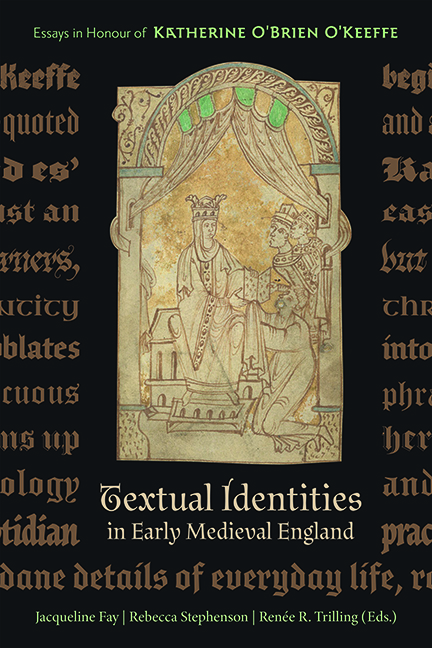Book contents
- Frontmatter
- Contents
- List of Illustrations
- List of Contributors
- Acknowledgments
- List of Abbreviations
- Introduction
- Part One Affect and Embodied Cognition in Medieval Didactic Texts
- Part Two Sovereignty, Power, and English Textual Identities
- Part Three Acts of Public Record in Making and Sustaining Communities
- Overview Of Career
- The Writings of Katherine O’Brien O’Keeffe
- Bibliography
- Index of Manuscripts
- General Index
- Tabula Gratulatoria
- Anglo-Saxon Studies
9 - Writings Among the Ruins: The Peterborough Chronicle and the House Archive
Published online by Cambridge University Press: 26 May 2022
- Frontmatter
- Contents
- List of Illustrations
- List of Contributors
- Acknowledgments
- List of Abbreviations
- Introduction
- Part One Affect and Embodied Cognition in Medieval Didactic Texts
- Part Two Sovereignty, Power, and English Textual Identities
- Part Three Acts of Public Record in Making and Sustaining Communities
- Overview Of Career
- The Writings of Katherine O’Brien O’Keeffe
- Bibliography
- Index of Manuscripts
- General Index
- Tabula Gratulatoria
- Anglo-Saxon Studies
Summary
AMONG THE surviving versions of the Anglo-Saxon Chronicle, the Peterborough Chronicle holds the distinction of being the latest maintained manuscript, with annals running up to 1154. The Peterborough Chronicle was first compiled in or somewhere around 1121, perhaps to replace an earlier manuscript that had been destroyed in the fire that devastated the monastery in 1116. The first scribe entered annals up to 1121, working from a lost exemplar of the northern recension, to which he added content that pertained specifically to the local history of his institution. These additions, commonly known as the Peterborough Interpolations, appear in some twenty annals, for years from the seventh century and into the twelfth. The same scribe added new annals up to 1131, a section now known as the First Continuation, and a second scribe later entered a block of annals that runs from 1132 to 1154, which is now known as the Second Continuation.
The two continuations have generally attracted the most scholarly attention, but this essay focuses on the earlier interpolations as part of an effort to build a local archive that promoted the ancient status of the monastery and protected its current proprietary rights and privileges. To achieve this goal, the Peterborough monks constructed over time an archive that consisted of multiple documentary modes, including the anonymous vernacular chronicle, the Latin chronicle of Hugh Candidus, several cartularies, and several single-sheet charter copies. Moreover, this archival network was in part constructed around a small group of twelfth-century forgeries that memorialized claims and privileges from the institution's early past. As one part of this project, the Peterborough Chronicle strategically incorporates material from those generative texts that provided a locus for broader compilation and elaboration.
The interpolations in the Peterborough Chronicle are most often incorporated into pre-existing material, but occasionally they constitute an entirely new annal, and many of the interpolations include vernacular summaries or translations of Latin documents, especially charters. Susan Irvine has observed that ‘the compilation has been designed to ensure that the Interpolations are as unobtrusive as possible’, with the compiler working ‘to smuggle Peterborough's records into the narrative so that they become seamlessly part of an authoritative account of English history’.
- Type
- Chapter
- Information
- Textual Identities in Early Medieval EnglandEssays in Honour of Katherine O'Brien O'Keeffe, pp. 207 - 224Publisher: Boydell & BrewerPrint publication year: 2022



